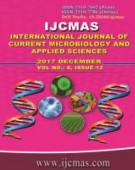


 National Academy of Agricultural Sciences (NAAS)
National Academy of Agricultural Sciences (NAAS)

|
PRINT ISSN : 2319-7692
Online ISSN : 2319-7706 Issues : 12 per year Publisher : Excellent Publishers Email : editorijcmas@gmail.com / submit@ijcmas.com Editor-in-chief: Dr.M.Prakash Index Copernicus ICV 2018: 95.39 NAAS RATING 2020: 5.38 |
Studies on the taxonomy and diversity of macrofungi have gained significance during the recent years, as many macrofungi are facing the risk of extinction because of habitat destruction. We report, here a systematic and detailed study on the diversity and distribution of wild mushrooms in the state of Assam, India, based on phenotypic and molecular characteristics. A total 44 samples were collected from various locations of Assam in different seasons during 2013-2015. Out of the total 44 samples, about 18 macrofungi species occurred during summer season, 9 species were recorded during rainy, 13 species were frequently found during autumn, 5 species in winter and 8 species were prominent during spring. The soil was found as major habitat for 18 collected species, while 10 species were collected from the tree/hardwood tree. This study indicated that the diversity and distribution of macrofungi are dependent on the plant community and the environmental conditions. Molecular characterization based on rDNA -ITS- ((Internal transcribed spacer) sequences revealed that the 44 samples belonged to 16 macrofungal families. Out of the 44 samples, 23 samples were reported to be edible and amongst the rest 21 non-edible strains, 5 strains have medicinal properties, 6 strains are poisonous, two has industrial application and the rest have not been fully explored.
 |
 |
 |
 |
 |